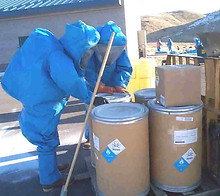Spill Prevention, Control, and Countermeasure (SPCC) Programs

What are SPCC Regulators looking for?
-
Not having an SPCC Plan.
-
The SPCC Plan must have a signature of approval by management.
-
The SPCC Plan needs to be self-certified or certified by a PE.
-
Not having written procedures for inspections.
-
Maintaining inspection records for 3 years.
-
Personnel not properly trained in spill prevention procedures.
-
Oil storage tanks having no secondary containment or improperly sized containment.
-
Facility security measures not being included in the SPCC Plan.
Why choose STEP to assist with your environmental needs?
Our goal is to develop plans that can be used successfully to prevent and control spills as
well as minimize impacts to the quality of surface water. We partner with our clients to gain
knowledge on the fundamental facility operations, spill response capabilities, and other key
concerns. We are then able to develop an effective plan based on facility knowledge, the
regulations, best management practices, and years of experience.
After determining the type of plan that your facility will need to develop, there are other
considerations that you will have to make. Providing manpower, equipment, and resources
together with management support are critical elements of your plan. You must also ensure
personnel are properly trained, ensure maintenance and inspections are in order, and maintain
records and documentation.
STEP has developed Spill Prevention and Control and Countermeasure (SPCC) plans,
Groundwater Protection Plans (GPP), Best Management Plans (BMP) and Integrated Contingency Plans (ICP) for a variety of clients.
Plans include:
-
Site audits and inspections to develop plans
-
Preparation of plans
-
Plan training
-
Review, revise, self-certification and re-certification of existing plans
-
PE Certification

_no%20background_white%20tagline.png)